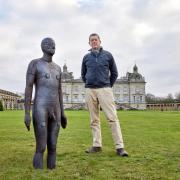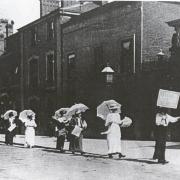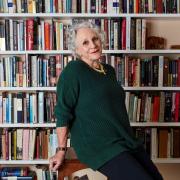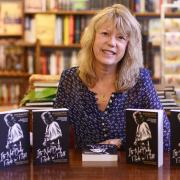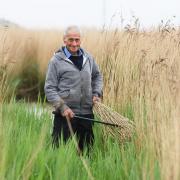Romans battle through Britain, the Second World War rages in Greece and now cyber crime is surging across the internet for best-selling Norfolk novelist Simon Scarrow
From centurions to science fiction, Simon Scarrow’s life in writing ranges across centuries and continents.
For decades he has been recreating the sights, sounds and smells of ancient Rome, his hugely popular historical novels taking his characters and readers through the conquest of Britain and then travelling to Rome itself, plus Egypt, Syria and beyond. The King of Jordan is a fan of the series and one of Simon’s favourite research trips was to a Roman fort, almost miraculously preserved in the desert sands.
“I was thinking of setting a book in Jordan, which has the best preserved Roman fort anywhere in the world, but I just didn’t know how to get there. The King didn’t know about it, neither did his minister of tourism, but they sent me out with guards and guides!” says Simon.
Not all his research trips are quite as exotic. Simon lives in Wicklewood, near Wymondham, and his favourite Roman site in Norfolk is the town of Venta Icenorum, now known as Caistor St Edmund. “Caistor is where I used to go and take the dogs. It’s where, if I had a problem in a book, walking one lap would resolve it, walking two laps would take the story on a bit,” he says.
But despite spending much of his working life in the ancient world the father of two teenage boys is delighted to be back in modern Norfolk at the end of each chapter. “Norwich is a fabulous city, it’s small enough that you can get everywhere and has enough variety to keep you interested. And then there’s Norfolk. There is something about the openness. One of my favourite spots on the planet is Winterton. You don’t have to walk far to have a bit of beach to yourself.”
Far from wishing to share it with Icenis or legionaries he says: “It was a rubbish time to live, there were no painkillers, there was no electric lighting, there was no anaesthetic . . .” His own history includes an operation without anaesthetic, after a skiing accident, at 18. He packed the wound with snow before an Italian soldier used his anaesthesia-free first aid kit to stitch it. Years later he used the experience for a scene in the aftermath of a Roman battle, but the biggest influences on his writing were the Latin and history lessons which left him besotted with ancient Rome.
He came to Norwich to study at the University of East Anglia, and then trained as a teacher, working at Costessey High School, near Norwich, East Norfolk Sixth Form College in Gorleston and City College Norwich.
Today his bestselling books are published in more than 20 languages and last year saw the publication of his 14th Eagles of the Empire novel. This year Invader, written with TJ Andrews and set in Roman Britain, is published, plus the paperback of his Second World War novel Hearts in Stone. And now he has finished his first science fiction novel, co-written with former pupil Lee Francis, who went on from City College Norwich, to work in the film industry, with jobs on movies including The Woman in Black and Harry Potter and the Deathly Hallows.
“It’s one of the great pleasures of teaching when you have someone become brighter than you,” says Simon.
He began the book in the early days of the internet. “Now a lot of it is actually happening!” he says. So can he see into the future as well as the past? “I just looked at what the internet was being used for, where the money was going,” he says. His agent called the result: “One of the most frightening things I’ve ever read.”
Soon Simon will be ready for his fictional characters to invade his real home, as their story collides with Boudicca’s revolt and they are immersed in a heady mix of historical fact and vividly imagined detail.
“It’s like going on holiday with old mates. They are chatting away inside your head and I’m like, slow down, I need to get this down!” says Simon.
As we talk in a Norwich cafe I know how he feels, as conversation ranges from ancient Rome to cyber crime and from the wonders of Winterton to the tragedy of Syria. He has visited Palmyra and is aghast at the destruction; he tells me how we only know of Boudicca because the Roman account of her life was discovered by an Italian monk more than 1,000 years later; and he leaves to continue filling in some of the blank spaces history has left.








